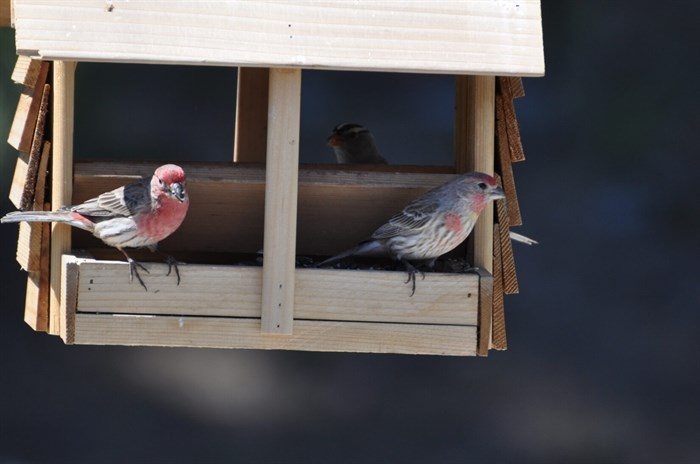
Finches on a bird feeder.
Image Credit: B.C. SPCA/Patrick O’Sullivan
January 23, 2021 - 10:22 AM
Seeing wild birds visit your backyard can be a joy but backyard feeders also come with risks.
Bird feeders can disrupt populations and increase the risk of disease, window strikes, predation, and conflicts with rodents and other wildlife attracted to the feeders, according to the B.C.SPCA.
In January, an outbreak of Salmonella resulted in many sick pine siskins in the Lower Mainland and south Vancouver Island. The disease spread when birds came together at bird feeders. More than 50 pine siskins have been admitted to Wild ARC in December and so far in January, with many showing signs of disease but few surviving due to the severity of their condition, according to the SPCA in a news release.
If you see sick birds at your feeder or in the area, immediately remove or clean your bird feeders to help curb the disease. Sick birds may appear lethargic, unusually fluffed up, and show signs of irritation around the eyes, according to the SPCA.
READ MORE: Why you should say bye to your bird feeder in the spring
Prevent disease outbreaks by regularly cleaning your feeder:
-
Discard any remaining seed before cleaning
-
Wash feeder with soap and water – use a bottle brush for small spaces
-
Wash feeder again with a 10% bleach solution
-
Rinse and air-dry completely
-
Fill with fresh seed
Except for liquid feeders, the SPCA recommends only providing bird feeders in winter between October and March as there is natural food for birds in the spring and summer months.
Clean feeders regularly with a 10% bleach dilution to prevent disease outbreaks.
To prevent window strikes, place feeders as far away from windows as possible. If it must be near a window, place it less than one metre away and use UV window decals or tape to prevent injury.
Place your feeders in protected areas, away from rain, snow and wind.
Consult your local bird feed or nature store to determine the right feed for the season and the species.
For your seed and suet feeders, wildlife-proof your feeder, or look to purchase models that are designed this way. Prevent rodent problems by having a dish to collect fallen seed, and make sure to regularly clean up spilled seeds.
Remember that backyard bird feeders can also attract cats – you can prevent problems by keeping your cat indoors, supervising outdoor time or buying a cat bib, and encouraging your neighbours to do the same.
Liquid hummingbird feeders do not attract rodents and other wildlife, but they can attract ants and other insects, and can cause deadly fungal or bacteria infections if not cleaned thoroughly and regularly, or if the nectar is prepared improperly. Hummingbird feeders also have special considerations for the winter.
The SPCA asks residents to avoid feeding birds like ducks, geese, swans, and gulls at parks, beaches or other areas. Some parks and municipalities have bylaws against feeding birds by hand because it is harmful for the birds. It causes them to suffer from malnutrition, bone deformation and death, creates conflict with humans, and contributes to environmental degradation and water pollution.
The B.C. SPCA recommends parks and municipalities strongly discourage feeding through education, bylaws and enforcement.
Contact the SPCA at 1-855-622-7722 for advice or for help finding your local wildlife rehabilitation centre.
To contact a reporter for this story, email Carli Berry or call 250-864-7494 or email the editor. You can also submit photos, videos or news tips to the newsroom and be entered to win a monthly prize draw.
We welcome your comments and opinions on our stories but play nice. We won't censor or delete comments unless they contain off-topic statements or links, unnecessary vulgarity, false facts, spam or obviously fake profiles. If you have any concerns about what you see in comments, email the editor in the link above.
News from © iNFOnews, 2021